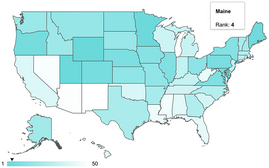
Nonprofit leaders rally amid federal funding cuts
Widespread termination of grants by the Trump administration sent many nonprofits reeling earlier this year.
But nonprofits are finding ways to respond, according to a panel convened this week by the National Council of Nonprofits. The session addressed critical steps organizations could take in response to the cancellation of federal grants in the first 100 days of President Donald Trump's term in office.
Amanda Fuchs Miller, president of Seventh Street Strategies and former deputy assistant secretary for higher education at the U.S. Department of Education in the Biden administration, led the presentation. She discussed ongoing litigation challenging the sudden federal funding withdrawals, and offered actionable recommendations for how nonprofit leaders can mitigate this crisis.
“We've seen these termination of grants happening across government agencies,” Miller said. “I think we all expected this to happen, in fiscal year 2025 and the fiscal year ‘26 budget, but I don't think anyone expected to see it so quickly, and that these funds are being cut and terminated mid budget cycle, mid-fiscal year, is unprecedented, and much sooner than any of us could have anticipated.”
Selected nonprofit federal grants are being canceled due to revised wording in Section 200 of the Uniform Guidance, which allows a federal agency to terminate a grant under certain circumstances. The section’s undefined language allows for broad latitude with federal action, which is now being combated in litigation. According to the webinar, the language reads, “Pursuant to the terms and conditions of the federal award, including to the extent authorized by law, if an award no longer effectuates the program goals or agency priorities.”
Nonprofit grants are typically approved well in advance, allowing agencies to build their budgets accordingly. The sudden halting of funds leaves little room for adaptation on such short notice, and is especially destructive for smaller nonprofits with fewer resources, Miller said.
In addition to advising on how to prepare for potential grant terminations, Miller also discussed pathways for recovering eligible funds and identifying allowable costs.
As for actionable steps, the council recommended several strategies: engaging with program officers to navigate the termination process, reviewing the specific reasons provided for termination, distinguishing between grant termination and continuation, exploring legal options, and notifying local members of Congress.
The National Council of Nonprofits has filed two major lawsuits confronting the Trump administration’s nonprofit budget cuts.
A lawsuit against the Office of Management and Budget "resulted in big and early wins, a halt to an action that would have had really catastrophic consequences for the nonprofit sector and the people and communities we serve,” said Tiffany Gourley Carter, public policy director and counsel for the National Council of Nonprofits.
Maine response

Jennifer Hutchins, executive director of the Maine Association of Nonprofits, highlighted the localized impact of the budget cuts on Maine’s nonprofit sector and the communities that depend on its services.
She was not part of the panel, but spoke with Mainebiz about the topics covered in the panel.
“It's hard to summarize what the impacts are and how they're coping, but suffice to say that there are many ways that nonprofits are having to adapt and pivot immediately with very little warning, and what's important is to recognize that many pauses and cancellations in funding are coming,” Hutchins said.
Nonprofits throughout the state provide a diverse range of services that directly effect community members. Hutchins outlined the real-world consequences of grant withdrawals on nonprofits, including cuts in funding for in domestic violence services, elder meal delivery programs, arts and humanities initiatives and ongoing research at Maine’s public universities and institutes, some of which focus on cancer research and ocean health, directly affecting the state’s fishing industry and ocean-based economy.
Maine is also unique in that, compared to the rest of the nation, it has a higher per capita number of people employed in the charitable and nonprofit sector.
“In the nation, about one out of every 10 workers works for a charitable nonprofit, but we know that about 17% of the Maine workforce works for charitable nonprofit 501(c)(3), and that translates to about one in every six workers working for charitable nonprofits. So nonprofits have a bigger influence on our economy than other parts of the nation,” Hutchins said.
Hutchins credited Maine’s nonprofit sector for its strong spirit of collaboration and commitment to problem-solving for the greater good. She emphasized that resilience is part of Maine’s identity, a trait she believes will carry nonprofits through this period of uncertainty as they seek alternative ways to continue delivering critical community services.
“I think Maine’s nonprofits have always been about bringing the community together to help solve shared problems," she said. "And with that definition, I think we need each other more than ever right now to figure out how we're going to take care of the things that need to happen and move forward in that direction."














0 Comments